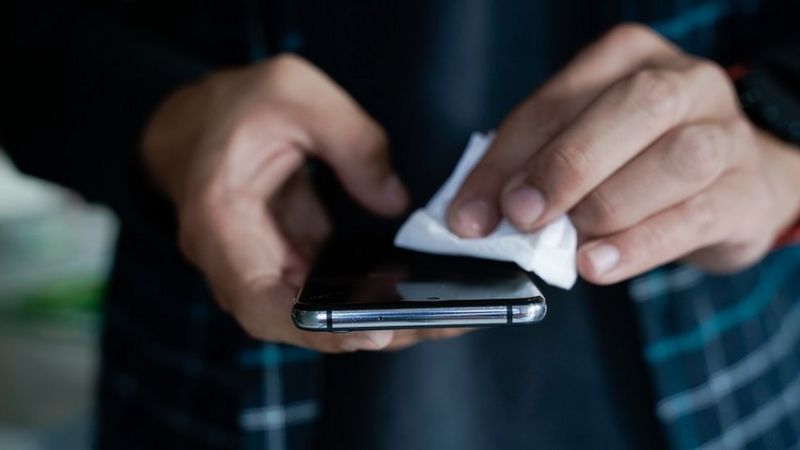(BBC) – The virus responsible for Covid-19 can remain infectious on surfaces such as banknotes, phone screens and stainless steel for 28 days, researchers say.
The findings from Australia’s national science agency suggest SARS-Cov-2 can survive for far longer on surfaces than previously thought.
The virus is most commonly transmitted when people cough, sneeze or talk.
But experts say it can also be spread by particles in the air, as well as on surfaces such as metal and plastic.
Previous laboratory studies have found that SARS-Cov-2 can survive for two to three days on bank notes and glass, and up to six days on plastic and stainless steel, although results vary.
But the latest research from Australian agency CSIRO found the virus was “extremely robust,” surviving for 28 days on smooth surfaces such as glass found on mobile phone screens and both plastic and paper banknotes, when kept at 20C (68F), which is about room temperature.
In comparison, the flu virus can survive in the same circumstances for 17 days.
The experiments were carried out in the dark, as UV light has already been shown to kill the virus.
“Establishing how long the virus really remains viable on surfaces enables us to more accurately predict and mitigate its spread, and do a better job of protecting our people,” said CSIRO chief executive Dr Larry Marshall.
The study, published in Virology Journal, found the virus survived for less time at hotter temperatures; it stopped being infectious within 24 hours at 40C on some surfaces.
It also stayed longer on smooth, non-porous surfaces than on porous materials such as cloth, which was found not to carry any infectious virus past 14 days.

Study highlights the need to wash hands as well as touchscreens regularly

Covid-19 spreads primarily through the air. Studies have shown that the virus can remain infectious in airborne particles for more than three hours. What’s less certain is the degree to which it can spread via surfaces such as banknotes and touchscreens.
Previous studies have assessed its survivability on stainless steel and their results have varied wildly, ranging from between three and 14 days at room temperature. The new study looked at how long the virus could survive on glass, paper and plastic notes as well as steel. They found that they could detect it after 28 days on all these surfaces at 20C – significantly longer than the earlier studies had indicated.
The experiments were, however, carried out in virus friendly conditions – in a dark room with stable temperatures and humidity – so the virus may well not do so well in the real world.
Even so, these results highlight the need to wash hands as well as touchscreens regularly and to avoid touching one’s face in order to minimise the risk of infection.

The study’s authors said the ability of SARS-Cov-2 to persist on stainless steel at cooler temperatures could explain outbreaks of Covid-19 at meat processing and cold storage facilities.
Thousands of workers have tested positive at meat processing factories and abattoirs around the world.
The CSIRO researchers also say their findings support previous research suggesting the virus can survive on fresh and frozen food.
The World Health Organization says: “There is currently no confirmed case of Covid-19 transmitted through food or food packaging.” But it does list a number of precautions you can take to avoid cross-contamination.

